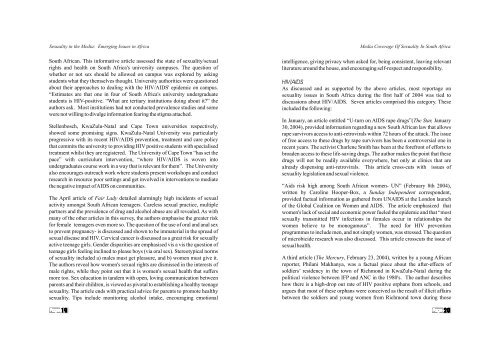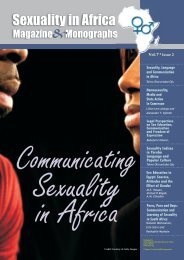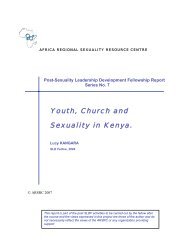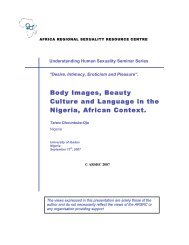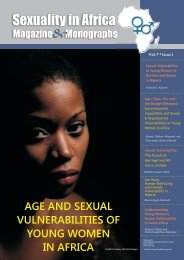Sexuality in Media: Emerging Issues in Africa - Africa Regional ...
Sexuality in Media: Emerging Issues in Africa - Africa Regional ...
Sexuality in Media: Emerging Issues in Africa - Africa Regional ...
You also want an ePaper? Increase the reach of your titles
YUMPU automatically turns print PDFs into web optimized ePapers that Google loves.
<strong>Sexuality</strong> <strong>in</strong> the <strong>Media</strong>: Emerg<strong>in</strong>g <strong>Issues</strong> <strong>in</strong> <strong>Africa</strong><br />
South <strong>Africa</strong>n. This <strong>in</strong>formative article assessed the state of sexuality/sexual<br />
rights and health on South <strong>Africa</strong>'s university campuses. The question of<br />
whether or not sex should be allowed on campus was explored by ask<strong>in</strong>g<br />
students what they themselves thought. University authorities were questioned<br />
about their approaches to deal<strong>in</strong>g with the HIV/AIDS' epidemic on campus.<br />
“Estimates are that one <strong>in</strong> four of South <strong>Africa</strong>'s university undergraduate<br />
students is HIV-positive. “What are tertiary <strong>in</strong>stitutions do<strong>in</strong>g about it?” the<br />
authors ask. Most <strong>in</strong>stitutions had not conducted prevalence studies and some<br />
were not will<strong>in</strong>g to divulge <strong>in</strong>formation fear<strong>in</strong>g the stigma attached.<br />
Stellenbosch, KwaZulu-Natal and Cape Town universities respectively,<br />
showed some promis<strong>in</strong>g signs. KwaZulu-Natal University was particularly<br />
progressive with its recent HIV/AIDS prevention, treatment and care policy<br />
that commits the university to provid<strong>in</strong>g HIV positive students with specialised<br />
treatment whilst they are registered. The University of Cape Town “has set the<br />
pace” with curriculum <strong>in</strong>tervention, “where HIV/AIDS is woven <strong>in</strong>to<br />
undergraduates course work <strong>in</strong> a way that is relevant for them”. The University<br />
also encourages outreach work where students present workshops and conduct<br />
research <strong>in</strong> resource poor sett<strong>in</strong>gs and get <strong>in</strong>volved <strong>in</strong> <strong>in</strong>terventions to mediate<br />
the negative impact of AIDS on communities.<br />
The April article of Fair Lady detailed alarm<strong>in</strong>gly high <strong>in</strong>cidents of sexual<br />
activity amongst South <strong>Africa</strong>n teenagers. Careless sexual practice, multiple<br />
partners and the prevalence of drug and alcohol abuse are all revealed. As with<br />
many of the other articles <strong>in</strong> this survey, the authors emphasise the greater risk<br />
for female teenagers even more so. The question of the use of oral and anal sex<br />
to prevent pregnancy- is discussed and shown to be immaterial <strong>in</strong> the spread of<br />
sexual disease and HIV. Cervical cancer is discussed as a great risk for sexually<br />
active teenage girls. Gender disparities are emphasised vis a vis the question of<br />
teenage girls feel<strong>in</strong>g <strong>in</strong>cl<strong>in</strong>ed to please boys (via oral sex). Stereotypical norms<br />
of sexuality <strong>in</strong>cluded a) males must get pleasure, and b) women must give it.<br />
The authors reveal how women's sexual rights are dismissed <strong>in</strong> the <strong>in</strong>terests of<br />
male rights, while they po<strong>in</strong>t out that it is women's sexual health that suffers<br />
more too. Sex education <strong>in</strong> tandem with open, lov<strong>in</strong>g communication between<br />
parents and their children, is viewed as pivotal to establish<strong>in</strong>g a healthy teenage<br />
sexuality. The article ends with practical advice for parents to promote healthy<br />
sexuality. Tips <strong>in</strong>clude monitor<strong>in</strong>g alcohol <strong>in</strong>take, encourag<strong>in</strong>g emotional<br />
<strong>Media</strong> Coverage Of <strong>Sexuality</strong> In South <strong>Africa</strong><br />
<strong>in</strong>telligence, giv<strong>in</strong>g privacy when asked for, be<strong>in</strong>g consistent, leav<strong>in</strong>g relevant<br />
literature around the house, and encourag<strong>in</strong>g self-respect and responsibility.<br />
HIV/AIDS<br />
As discussed and as supported by the above articles, most reportage on<br />
sexuality issues <strong>in</strong> South <strong>Africa</strong> dur<strong>in</strong>g the first half of 2004 was tied to<br />
discussions about HIV/AIDS. Seven articles comprised this category. These<br />
<strong>in</strong>cluded the follow<strong>in</strong>g:<br />
In January, an article entitled “U-turn on AIDS rape drugs”(The Star, January<br />
30, 2004), provided <strong>in</strong>formation regard<strong>in</strong>g a new South <strong>Africa</strong>n law that allows<br />
rape survivors access to anti-retrovirals with<strong>in</strong> 72 hours of the attack. The issue<br />
of free access to these drugs by rape survivors has been a controversial one <strong>in</strong><br />
recent years. The activist Charlene Smith has been at the forefront of efforts to<br />
broaden access to these life-sav<strong>in</strong>g drugs. The author makes the po<strong>in</strong>t that these<br />
drugs will not be readily available everywhere, but only at cl<strong>in</strong>ics that are<br />
already dispens<strong>in</strong>g anti-retrovirals. This article cross-cuts with issues of<br />
sexuality legislation and sexual violence.<br />
“Aids risk high among South <strong>Africa</strong>n women- UN” (February 8th 2004),<br />
written by Carol<strong>in</strong>e Hooper-Box, a Sunday Independent correspondent,<br />
provided factual <strong>in</strong>formation as gathered from UNAIDS at the London launch<br />
of the Global Coalition on Women and AIDS. The article emphasized that<br />
women's lack of social and economic power fueled the epidemic and that “most<br />
sexually transmitted HIV <strong>in</strong>fections <strong>in</strong> females occur <strong>in</strong> relationships the<br />
women believe to be monogamous”. The need for HIV prevention<br />
programmes to <strong>in</strong>clude men, and not simply women, was stressed. The question<br />
of microbicide research was also discussed. This article crosscuts the issue of<br />
sexual health.<br />
A third article (The Mercury, February 23, 2004), written by a young <strong>Africa</strong>n<br />
reporter, Philani Makhanya, was a factual piece about the after-effects of<br />
soldiers’ residency <strong>in</strong> the town of Richmond <strong>in</strong> KwaZulu-Natal dur<strong>in</strong>g the<br />
political violence between IFP and ANC <strong>in</strong> the 1980's. The author describes<br />
how there is a high-drop out rate of HIV positive orphans from schools, and<br />
argues that most of these orphans were conceived as the result of illicit affairs<br />
between the soldiers and young women from Richmond town dur<strong>in</strong>g those


